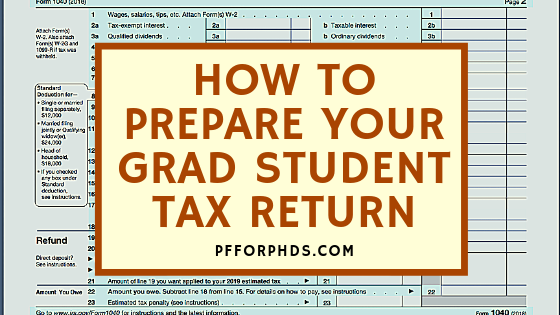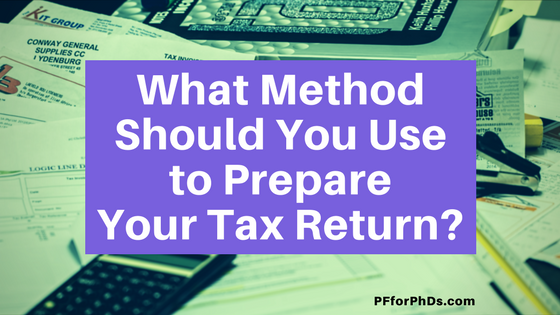One of the most puzzling tax scenarios that is common in academia—but almost unheard of outside of it—is fellowship or training grant funding because it is neither a wage nor self-employment income. Fellowships and training grants, which I call “awarded income,” frequently pay the stipends and salaries of graduate students, postdocs, and postbacs. This post explains the weird tax situations for fellowship and training grant recipients and how to address them. I’ll clarify right up front that you do need to incorporate your awarded income into the gross income you report on your tax return, and you almost certainly will end up paying tax on it (unless your total income is very low or you have lots of other deductions/credits).

This article was last updated on 1/17/2025. It is intended for US citizens, permanent residents, and residents for tax purposes. It is not tax, legal, or financial advice.
Further reading/viewing:
- How to Prepare Your Grad Student Tax Return
- Fellowship and Training Grant Tax Forms
- Grad Student Tax Lie #1: You Don’t Have to Pay Income Tax
- Scholarship Taxes and Fellowship Taxes | Taxes for college students, grad students, and postdocs
I have to define my terms up front here because “fellowship” is used variously inside and outside of academic research, and these weird tax situations don’t always apply. What I’m talking about is when your income from your academic/research role is not reported on a Form W-2 (and you’re not self-employed).
Often, though not always, winning an external or internal fellowship generates this kind of income. The National Science Foundation Graduate Research Fellowship (GRFP) and the Department of Defense National Defense Science and Engineering Graduate Fellowship (NDSEG) are among the most well-known examples of this type of income at the graduate level for STEM fields. Basically, you’re being paid because you won an award, not because you are directly trading work or time for money. This kind of income can also come from training grants, such as the National Institutes of Health Ruth L. Kirschstein Institutional National Research Service Award (T32), and in those cases you might or might not be labeled a fellow by your institution.
If your income is reported on a Form W-2, whether it’s called a fellowship or not, this post doesn’t apply to you!
Personally, over my time in/near academia, I received awarded income on five occasions:
- I was postbaccalaureate fellow at the NIH for a year between undergrad and grad school, and my income was reported on a 1099-G.
- I was on a training grant in my first year of grad school, and my income was reported on a 1099-MISC in Box 3.
- I won an internal fellowship for my second year of grad school, and my income was reported on a 1099-MISC in Box 3.
- I was paid from my advisor’s discretionary funds in my sixth year of grad school, and my income was reported on a 1099-MISC in Box 3.
- I was a Christine Mirzayan Science and Technology Policy Fellow at the National Academy of Engineering, and my income was reported on a 1099-MISC in Box 3.
Receiving Unusual Tax Forms
The way to definitively tell that you’re receiving awarded income is that you don’t receive a Form W-2 at tax time for your income, which was likely paid similarly to a regular salary or perhaps in a lump sum per term. Instead, you might see your income reported on some other strange tax form:
- Form 1098-T
- Form 1099-MISC
- Form 1099-NEC
- Form 1099-G
There are other possible mechanism for this reporting; these are the four most commonly used by universities and funding agencies.
None of these forms was designed for reporting awarded income and none do it very well, but they do get the job done if you know what you’re looking for.
Form 1098-T
Form 1098-T, which is issued to some students depending on your university’s policies, is sort of a clearinghouse form for the sum of your fellowships/scholarships/grants received (in Box 5) and also the sum of the qualified tuition and related expenses that were paid (Box 1) to your student account. Your fellowship income might be lumped in with your scholarships in Box 5, which makes them a little hard to parse, or Box 5 might only include your scholarships (see next section if so).
The good thing about Form 1098-T if it includes your fellowship income is that it does put front and center two of the important numbers you’ll need to work with when you prepare your tax return, the sum of your awarded (fellowship, scholarship, and grant) income (Box 5) and a subset of your Qualified Education Expenses (Box 1). You don’t really need to know what your fellowship income was independent of your additional scholarship/grant income See Weird Tax Situations for Fully Funded Grad Students for more details about working with Form 1098-T.
Form 1099-MISC
Form 1099-MISC is a slightly confusing form to receive for fellowship income.
Any non-academic who hears/sees that you have income reported on a 1099-MISC is going to think you’re self-employed. Self-employment and contractor income used to be reported in Box 7, which no longer exists following the creation of Form 1099-NEC (see next). Fellowship income usually shows up in Box 3, “Other income.” If you are a grad student or postdoc, you are not self-employed; do not pay self-employment tax!
The instructions for the 1099-MISC tell you to (“generally”) report your Box 3 “Other income” in the “Other income” line on your Form 1040 Schedule 1. There is a precise line on which you should do so: Form 1040 Schedule 1 Line 8r, which is labeled “Scholarship and fellowship grants not reported on Form W-2.”
Form 1099-NEC
The IRS resurrected Form 1099-NEC, which stands for “non-employee compensation,” starting in tax year 2020. All self-employment and contractor income is now supposed to be reported in Box 1.
Unfortunately, a minority of funding agencies are also reporting awarded income on Form 1099-NEC Box 1. Similar to Form 1099-MISC, if you are certain that this income is fellowship or training grant income and not self-employment income, you should report it as fellowship income on your tax return. If you erroneously report it as self-employment income, you will pay self-employment tax (15.3%) and exclude yourself from taking a higher education tax break.
Form 1099-G
Form 1099-G is typically used when the funding body is part of the federal government. The awarded income shows up in Box 6, “Taxable grants.”
Further reading:
- How to Prepare Your Grad Student Tax Return
- Where to Report Your PhD Trainee Income on Your Tax Return
Receiving No Tax Forms
Going along with the theme of not receiving a Form W-2 at tax time, you might very well not receive any tax form at all! It’s very common for there to be zero communication between the organization that pays the fellowship and the fellowship recipient. Other times, the fellow might receive what I call a “courtesy letter,” which is just a short, informal letter stating the amount of fellowship money paid.
Further reading: What Is a Courtesy Letter?
Fellows who don’t receive tax forms or whose institutions and funding agencies don’t communicate with them at all about their personal taxes may feel completely adrift. They have no idea where to even start with preparing their tax returns. Many pay no taxes at all (if you know someone like that, send them this article!) since it takes a certain level of awareness of your tax responsibility to even wonder if you need to pay income tax. Even those who suspect they need to report and pay tax on their fellowship income might be daunted by the task of figuring out from scratch exactly how to do that.
Further listening: Do I Owe Income Tax on My Fellowship?
But it’s really a simple process to carry out if you know what to do! You should be able to find the amount of fellowship or training grant income you were paid for the whole year from your bank records. If you’re not a student, you just straight report that number in Form 1040 Schedule 1 Line 8r. If you are a student, you have to work with your other scholarships and qualified education expenses a bit before reporting a number for your awarded income; see Weird Tax Situations for Fully Funded Grad Students for more details.
Further reading: Where to Report Your PhD Trainee Income on Your Tax Return

Quarterly Estimated Tax
In my observation, the great majority of awarded income recipients have the responsibility of paying quarterly estimated tax—and many, many, many neglect to do so. If you need one level of awareness to even understand you’re supposed to pay tax on your fellowship income, you need an even higher level of awareness before you follow through on paying quarterly estimated tax. In fact, if the organization providing you the fellowship didn’t mention this, it’s not a water cooler topic around your department, and/or you’ve never been self-employed or close to someone who is self-employed, you almost certainly wouldn’t know to do it.
The basic principle here is that the IRS expects to receive tax payments throughout the year, not just in April when your tax return is due. If you owe enough additional tax at the end of the year (and don’t qualify for an exception), the IRS is going to demand not only your tax payment but late fees and interest as well.
The main system for sending tax in to the IRS is tax withholding on a normal paycheck. If you don’t do that or your withholding isn’t sufficient, you’re supposed to pay estimated tax. Basically, you send in a payment (no forms need to be filed) to the IRS four times per year to make sure you don’t have too much extra tax due when you file your yearly tax return. You should work through the estimated tax worksheet on p. 8 of Form 1040-ES to figure out if you are required to pay quarterly estimated tax and in what amount; you can also find the instructions for filing it in that form.
Further reading: The Complete Guide to Quarterly Estimated Tax for Fellowship Recipients

Taxable Compensation and Earned Income Tax Breaks
Some of the tax breaks the IRS offers are contingent on the type of income you have, and fellowship income (not reported on From W-2) does not necessarily qualify.
Individual Retirement Arrangement
To contribute to an Individual Retirement Arrangement (IRA), you (or your spouse) must have “taxable compensation.”
Through 2019, the definition of “taxable compensation” did not include fellowship and training grant income not reported on Form W-2. However, starting in 2020, the definition of “taxable compensation” changed for graduate students and postdocs to include fellowship and training grant income even if not reported on From W-2.
Therefore, all types of graduate student and postdoc taxable income, whether reported on a Form W-2 or not, is eligible to be contributed to an IRA starting in 2020.
Further reading:
- Fellowship Income Is Now Eligible to Be Contributed to an IRA!
- The Graduate Student Savings Act Fixes a Major Flaw in Tax-Advantaged Retirement Accounts
Earned Income Tax Credit
The Earned Income Tax Credit (EITC) or Earned Income Credit (EIC) is a credit extended to low-income individuals and families. If your household income is quite low and/or you have one or more children, you might be able to receive the credit. As the name implies, you need “earned income” to qualify for the EITC. Unfortunately, fellowship/scholarship income is not considered “earned income” (Publication 596 p. 18). Puzzlingly, having zero earned income disqualifies you from the credit, but having too much non-earned income also disqualifies you from the credit. The definition of earned income also plays into the calculations for the Child Tax Credit and Additional Child Tax Credit.
Dependent Status
When you are trying to determine if you should file a tax return as an independent adult vs. a dependent of your parents, it is more difficult to qualify as independent with fellowship income rather than an equal amount of W-2 income. (This only applies to students under age 24.) While education expenses count as part of the amount of money that goes toward your “support,” scholarships and fellowships that you won do not count as you providing your own support.
Kiddie Tax
Fellowship income counts as unearned income for the purposes of being subject to the Kiddie Tax. If you are under the age of 24 on December 31 and a student, your “unearned” income exceeding $2,700 may be subject to a higher tax rate than the ordinary rate.
Further reading: Fellowship Income Can Trigger the Kiddie Tax








